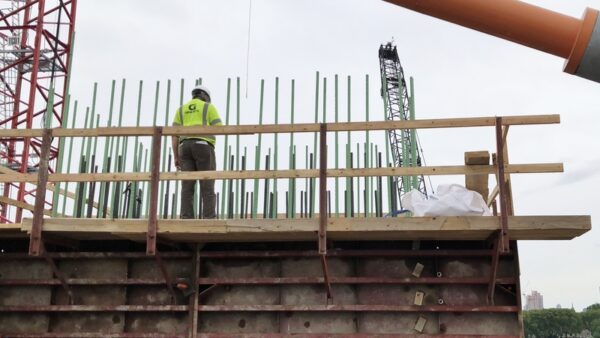UK housebuilders have lost as much as 40% of their value since it was announced on Friday that a majority of British voters had opted to leave the EU.
Shares in two of the largest listed companies, Persimmon and Taylor Woodrow, fell by about a quarter, followed by Barratt and Berkeley Homes, which were down by a fifth.
Today share prices remained subdued, despite a global rally on the back of positive data from China and Germany.
Persimmon, which was trading at 2,000p before the Brexit result was known before falling to around 1,500p on Friday was this morning trading at 1,420p. Berkeley Group, which fell from 3,200p to 2,000p before finding a new floor at 2,600p, was trading at 2,443p mid-morning.
A lot of the big market-makers were expecting Remain to win– Kevin Cammack, Cenkos Securities
The UK’s housing market had already been hit by uncertainty over the outcome of the referendum, with Berkeley Group, the UK’s seventh biggest housebuilder by homes completed, warning in June that there had been a 20% drop in reservations, particularly in the London area.
Kevin Cammack, an analyst with Cenkos Securities, cautioned against taking these figure at face value. He said: “A lot of the big market-makers were expecting Remain to win, so housebuilders’ stock prices were up 10-15% in the week before the vote and they were positioned quite positively, with stock on their books.
“Brexit automatically wiped out the run-up gain, and the market-makers then overreacted to avoid taking on more stock. So, the fall wasn’t caused by trading, but by the need to find a position where trade was stable. There was very little institutional trade on the Friday, then there was a little on the Monday but it was all selling, which scared the markets even more.”
In the medium term, the housing industry in the UK will have to contend with a number of potentially unfavourable trends, according to Cammack. The fall in the price of sterling will increase the cost of importing materials.
Confidence will be affected by the prospect of a possible future restriction on immigration from EU member states, which would increase the cost of labour. At the same time, falling levels of immigration could reduce demand for new homes. Cammack described this as “a pincer attack on profits”.
George Osborne, the chancellor of the exchequer, warned in May that a vote to leave the EU would lead to a decline in house prices of between 10% and 18%, a prediction that was dismissed by those advocating withdrawal as “project fear”.
The industry is now being kept in suspense by the lack of a plan regarding the invocation of Article 50, which would set a two-year timeframe for exit negotiations.
Uncertainty is amplified further by a state of political limbo in the UK, with the ruling Conservative Party preparing for a leadership race following Friday’s resignation of Prime Minister David Cameron.
It is expected that the country will have a new Conservative government by 2 September, but the industry’s fortunes will be affected by whether that new government continues the present regime’s austerity policy or tries to stimulate demand by investing in infrastructure.
“If the UK ends up having a recession I think it will be an investment-led one rather than being consumer or finance-led,” said Cammack. “For the market and individual companies, the appropriate thing to do in uncertain times is to do nothing. I’m confident that you’ll see weakness in commercial and private sector new orders over next three to six months.”
He added: “The unknown factor is whether the public sector will be the cavalry. Does government say, to combat this we’re actually going to be more aggressive about our infrastructure spending, and bring forward High Speed 2 by a year and concentrate on the northern section. The driver of growth in the past couple of year has been housing and commercial in the private sector. We can’t rely on that over next year or two.”
Image: Housebuilders’ stock prices were up 10-15% in the week before the vote (Bellway Homes)
Comments
Comments are closed.







I firmly believe the industry will pleasantly surprise itself as will the markets. The UK has enjoyed relative economic stability over the last 3 years and we have to remember our national debt is falling whereas in the EU its 1200 Billion and rising, the EU will continue to need the financial stability of the UK. Although Brexit will have come as a shock,,, for those House Builders who prepared themselves through the use of risk registers and mitigation strategies, they will no doubt see new opportunities being afforded them.
Obviously the cost of importing raw materials and building products could rise due to the weak pound and therefore impact on the profitability of current development schemes. However we must see this as an opportunity to strengthen the home grown market and to create new vibrant supply industries from within the UK. Our home grown manufacturing companies have undoubtedly suffered over the last decade due to the influx of Investors from the EU such as Saint Gobain.
We still have a shortage of skilled tradesman in the UK and if the industry talks itself into recession this will exacerbate this even further! This is a time to be positive and to have reasonable expectations as to house sale prices. By doing so House Builders will be the masters of their own economic outlook.
(Comment on the photograph You can’t fix a cripple/Jack rafter with a plasterboard nail.. :)… )
“At the same time, falling levels of immigration could reduce demand for new homes.”
The demand for homes isn’t really impacted by current immigration. Its impacted by the under 30s who still haven’t purchased a property and the fact the industry is still under delivering for the pent up demand from 10plus years ago.
I think most other statements have a sensible base point, but when you consider the above, the risk of a slow down in house sales and a recession are only related to the financial sector and whether money continues to be lent.
Let’s not talk ourselves into the recession!